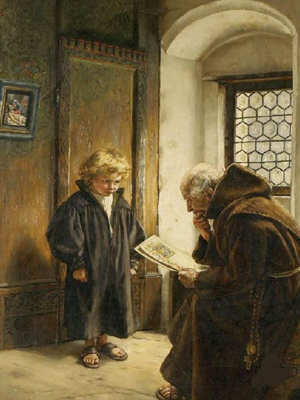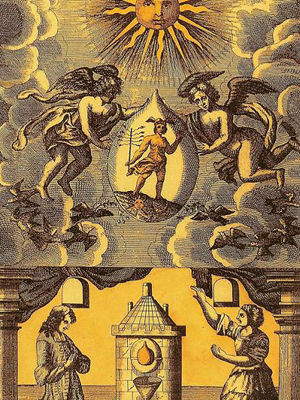Masonic Articles and Essays
The Ideal Mason
Carl H. Claudy
Date Published:
6/2/2023
Taken from the "Old Tiler Talks" series by Bro. Carl H. Claudy, this dialogue details the qualities by which a truly "ideal" Mason would have to live.
 “So you think Brother Parkes is an ideal Mason, do you?” asked the Old Past Master of the Young Brother. “I like Brother Parkes, but before I gave assent to your adjective of ‘ideal’ I'd like to have you define it.”
“So you think Brother Parkes is an ideal Mason, do you?” asked the Old Past Master of the Young Brother. “I like Brother Parkes, but before I gave assent to your adjective of ‘ideal’ I'd like to have you define it.”
“What I meant,” answered the Younger Brother “was that he is so well rounded a Mason. He is Brotherly, charitable, loves a good speech and a good time, and does his Masonic duty as he sees it.”
“Oh! Well, if that’s being an ideal Mason, Parkes is surely one. But I can’t follow your definition of ideal. For there are so many ideals in Freemasonry, and it has been given to few...I doubt, really, if it has been given to any...man to realize them all. Certainly I never knew one.
“There are so many kinds of Masons! I do not refer now to the various bodies a brother may join; Chapter, Council, Commandery, Scottish Rite Lodge, Chapter, Council, Consistory, Shrine, Grotto, Tall Cedars, Eastern Star; a man may belong to them all and still be just one kind of Mason.
“When I speak of ‘kinds’ of Masons I mean ‘kinds of ideals’.
“There is the man whose ideal of Masonry is ritual. He believes in the ritual as the backbone of the fraternity. Not to be letter perfect in a degree is an actual pain to him; he cares more for the absolute accuracy of the lessons than the meaning in them. His ideal is a necessary one, and to him we are indebted for our Schools of Instruction, for our accuracy in handing down to those who come after us, the secret work, and to a large extent, for what small difficulties we put in the way of a candidate, by which he conceives a regard for the Order. What is too easily obtained is of small value. Making a new Mason learn by rote some difficult ritual not only teaches him the essential lessons, but makes him respect that which he gets by making it difficult.
“There is a brother with the social ideal of Masonry. To him the Order is first a benevolent institution, one which dispenses charity, supports homes, looks after the sick, buries the dead, and, occasionally, stages a ‘ladies night’ or a ‘free feed’ or an ‘entertainment’. He is a man who thinks more of the lessons of brotherly love than the language in which they are taught; as a ritualist, he uses synonyms all the time, to the great distress of the ritually-minded Mason. To the social ideal of Masonry and those to whom it makes its greatest appeal we are indebted for much of the public approbation of our Order, since in its social contacts it is seen of the world.
“There are brethren to whom the historical, perhaps I should say the archeological ideal, is the one of greatest appeal. They are the learned men; the men who dig in libraries, read the books, who write the papers on history and antiquity. To them we are indebted for the real, though not yet fully told story of the Craft. They have taken from us the old apocryphal tales of the origin of the Order and set Truth in their places; they have uncovered a far more wonderful story than those ancient ones which romanticists told. They have given us the right to venerate our age and vitality; before they came we had only fables to live by. To them we owe Lodges of Research, histories, commentaries, the great books of Masonry and much of the interpretation of our mysteries.
 “Then there is the symbolist. His ideal is found in the esoteric teachings of Freemasonry. He is not content with the bare outline of the meaning of our symbols found in our lectures-he has dug and delved and learned, until he has uncovered so great a wealth of philosophical, religious and fraternal lessons in our symbols as would amaze the Masons who lived before the symbolist began his work.
“Then there is the symbolist. His ideal is found in the esoteric teachings of Freemasonry. He is not content with the bare outline of the meaning of our symbols found in our lectures-he has dug and delved and learned, until he has uncovered so great a wealth of philosophical, religious and fraternal lessons in our symbols as would amaze the Masons who lived before the symbolist began his work.
“To him we are indebted for such a wealth of beauty as has made the Craft lovely in the eyes of men who otherwise would find in it only ‘another organization.’ To him we are indebted for the greatest reasons for its life, its vitality. For the symbolist has pointed the way to the inner, spiritual truths of Freemasonry and made it blossoms like the rose in the hearts of men who seek, they know not what, and find, that which is too great for them to comprehend.
“These are but other ideals of Freemasonry, my son, but these are enough to illustrate my point. Brother Parkes follows the social ideal of Freemasonry, and follows it well. He is a good man, a good Mason, in every sense of the word. But he is not an ‘ideal’ Mason. An ‘ideal’ Mason would have to live up to, to love, to understand, to practice, all the ideals of Freemasonry. And I submit, it cannot be done.
“What's your ideal of Freemasonry?” asked the Younger Mason curiously, as the Old Past Master paused.
“The one from which all the things spring,” was the smiling answer. “I am not possessed of a good enough memory to be a fine ritualist; I don't have time enough to spare for many of the social activities of Masonry, I am not learned enough to be historian or antiquary, nor with enough vision to be an interpreter of symbols for any man but myself. My ideal is the simple one we try to teach to all, and which, if we live up to it, encompasses all the rest; the Fatherhood of God, and the brotherhood of man.”
More Masonic Articles
Explore articles and essays written by Freemasons about Freemasonry.
Read More
Membership
Interested in becoming a member of the worlds oldest Fraternal organization?
Read More